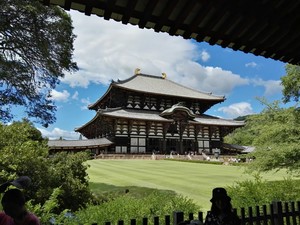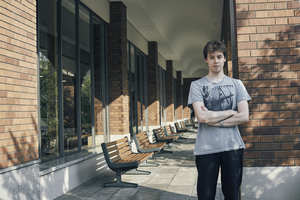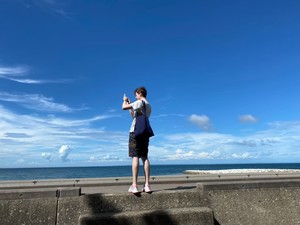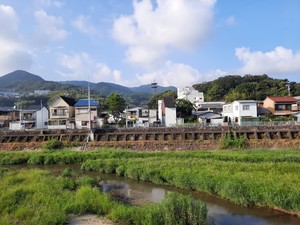Voice from International Students
Regular Student

Mischa Aleksej Krueger
Electrical and Electronic Engineering, SE (Master)
Self-Funded International Student
Period
April, 2019 ~ March, 2021
The reason why you decided to study abroad

Born and raised in Hamburg, Germany, I spent my whole life in my hometown. Making my
Abitur (the German version of a high school degree), I entered the TUHH – Technical University Hamburg. While
progressing with my Bachelor of Science degree, I randomly caught interest in Japanese language from a few guides
online. I studied my first Kana with fascination, and enthralled by being able to recognize them again in various
media - namely in Anime – I have stayed excited about the language from there on.
It did not take much time when I took the opportunity to enroll in optional Japanese language courses where I
seriously started to learn the language. In the meantime I decided that I definitely want to do a study-abroad
experience in Japan, first only for a single semester, then I reconsidered and sought a full 2-year study
opportunity with a resulting degree. I soon found Doshisha University and its ISTC program which perfectly suited
my ambitions: Experiencing Japan and continue my studies in my desired major. Because I had no partner university
to help me after my first graduation, I applied as a self-financed student and used a buffer year between my
Bachelor graduation and enrollment in Doshisha to work full-time and earn the necessary money as well as organize
my stay in the Kansai area.
Daily life
Establishing my everyday life took some time. But I was supported from the beginning by
Doshisha’s offices staff (OIS & faculty office) and by my supervisors and professors. Because I was a
self-financed student, I gladly received 30% tuition reduction together with a scholarship covering many of my
extracurricular expenses, especially expenses such as apartment rent.
Little by little I began to get used to the new environment. I steadily furnished my apartment and grew accustomed
to manage my living: How to pay for groceries, order food or redeem payments. I made quickly friends with my lab
mates and others that I became acquainted with through lectures or Co-Learning Program.
My university schedule was very flexible except the obvious regular attendance to lectures. For the ISTC – but
also like every other master’s student at Doshisha – research work is conducted. I was allowed to start off with a
self-chosen topic, related to the overall laboratory purpose; in my case in direction of circuit simulation at the
Electric Circuits and Systems Laboratory. State of research was communicated on a usually regular basis
approximately each month. Meetings were held each week to discuss about various organizational things.
Additionally to the required lectures without influence on the final grade (GPA), I also attended Japanese
language courses voluntarily and learned Japanese in my spare time 1-2 hours a day in average – as long as I had
not a long day.
During the semester holidays I took the opportunity to travel in Japan or to pay a visit to family in my home
country. Although Japan’s “highways” are absolutely not comparable with highways in Germany (the notorious
“Autobahn”), the road trip to Kyushu was an unforgettable experience.
However, all this changed with the appearance of COVID-19. I believe I was extremely lucky: Japan appeared to have
handled the pandemic fairly well in the sense that there were not any tight or severe lockdown restrictions that
intervened greatly in personal freedom. But also Doshisha University put anti-corona measures into place: Mainly
by restricting entry into the campus and moving lectures to the internet. With gradual improvement of the
infection situation, these restrictions were loosened and entry into the campus and laboratories became possible
again. For my research, I was able to continue it at home on my personal computer because of its theoretical
nature. Personal small-class lecturing was reintroduced. Surely, it has not been ideal, but I got along quite
well. Doshisha continued to support me during this time and has handled the situation fine in my opinion.
Why you should consider to go to Doshisha University

Japan is an awesome country, and there is offered so much at Doshisha.
From the direct support, the friendly and open school environment to job hunting, your life and career is
supported in every way.
It has been the best decision in my life. It has not always been easy, but it is a highly rewarding experience in
every way. Japan has significantly influenced, even shaped the person who I am right now. It is now a part of my
life I cannot imagine to be without. Japan is an incredible country I learned to really love.
If you are willing to do the experience and commit to it, I can guarantee you that you will remember it for life.
1 day Schedule in Japan
Weekdays
| 8:00~11:00 | Wake up and breakfast (time depending on lectures) |
|---|---|
| 11:00~18:00 | (Sometimes earlier, sometimes later) Go to university: Research, lecture preparation or wrap-up, other lecture related activities |
| 12:00~15:00 | (In between) Lunch |
| 18:00 | Go home |
| 18:30 | Cooking and dinner |
| 20:00 | Continue with research at home, organize university related matters, others |
| 22:00 | Learn Japanese |
| 24:00 | Continue with research or leisure time |
| 2:00 | Go to bed |
Weekend
| 10:00~11:00 | Wake up and breakfast |
|---|---|
| 12:00 | Clean and tidy up apartment, laundry, etc. |
| 15:00 | Go out with friends / prepare for lectures / hanging out by myself |
| 21:00 | Learn Japanese |
| 23:00 | Leisure time |
| 2:00 | Go to bed |

